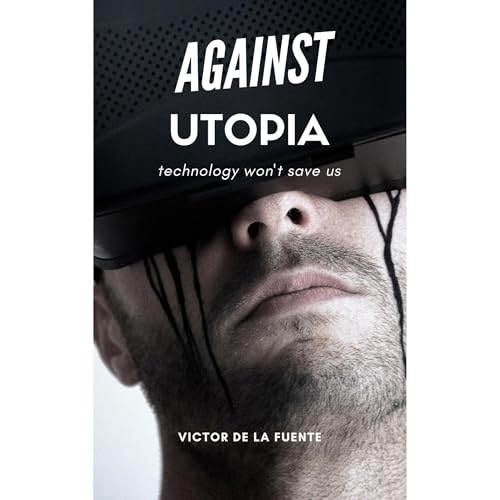
Against Utopia - Technology won't save us
Deep thoughts about metaverses, driverless cars, AI, BTC, NFTs, cryptocurrencies, biogenetics and Singularity
No se pudo agregar al carrito
Add to Cart failed.
Error al Agregar a Lista de Deseos.
Error al eliminar de la lista de deseos.
Error al añadir a tu biblioteca
Error al seguir el podcast
Error al dejar de seguir el podcast
 Exclusivo para miembros Prime: ¿Nuevo en Audible? Obtén 2 audiolibros gratis con tu prueba.
Exclusivo para miembros Prime: ¿Nuevo en Audible? Obtén 2 audiolibros gratis con tu prueba.Compra ahora por $3.99
-
Narrado por:
-
Virtual Voice

Este título utiliza narración de voz virtual
Against Utopia: Technology Will Not Save Us is a book that unsettles because it dismantles an illusion. We live surrounded by discourses that promise a perfect future built on algorithms, metaverses, and machines that make decisions for us. The dominant narrative speaks of self-driving cars that will end accidents, of artificial intelligences that will solve what humans cannot, of cryptocurrencies that will free the economy, of genetic advances that will perfect life, and of a Singularity that will take us beyond our own intelligence. But behind that vision lies a false promise: the idea that technology, on its own, will be enough to save us.
The author, a technophilosopher, invites us to question this mirage. The transformative power of each innovation is acknowledged, but all of them carry the imprint of those who create them: biases, ethical dilemmas, hidden interests, and unforeseen consequences. The metaverse, with its promise of parallel worlds where anything is possible, may end up eroding the way we relate to each other. Autonomous vehicles, heralded as the dawn of a new era in mobility, raise unsettling questions about work, decision-making power, and dependence on systems we barely understand.
Artificial intelligence, far from being neutral, reflects and amplifies our limitations; and although cryptocurrencies and NFTs are presented as symbols of freedom and disruption, their environmental impact, volatility, and speculative use reveal a darker side. Even biogenetics, capable of altering the most intimate aspects of life, forces us to confront questions that verge on the sacred: What does it mean to intervene in the code of the human? Where do we draw the line? And on the horizon looms the Singularity, that promise of a definitive leap into the posthuman, which inspires not so much hope as vertigo.
This book does not seek to deny the importance of innovation or to paint a bleak future for the mere sake of criticism. Its aim is a critical exercise: to look at technology without the veil of utopia, to accept its power and, at the same time, its risks and limitations. Because the real decision does not lie in the machines, but in the way we choose to coexist with them.
Against Utopia is, ultimately, an invitation to think calmly in a time that seems to be moving far too fast. A call not to confuse promises with certainties, and to remember that the future is not designed solely with code, but with responsibility, reflection, and human consciousness.


